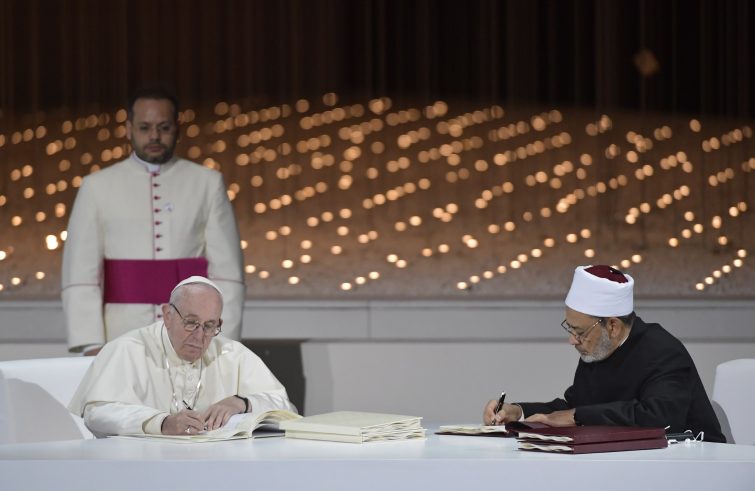
 “This is clearly a fruit of the Document on Human Fraternity and a highly meaningful step towards making the whole world remember, at least once a year, that we are all brothers and sisters”, said Cardinal Miguel Ángel Ayuso Guixot, President of the Pontifical Council for Interreligious Dialogue, commenting on the decision taken last 21 December by the United Nations General Assembly to proclaim 4 February as the International Day of Human Fraternity. The date is no coincidence. On 4 February 2019, during the apostolic journey to the United Arab Emirates, the Pope and the Grand Imam of Al-Azhar, Ahmad Al-Tayyeb, signed the “Document on Human Fraternity for World Peace and Living Together”. In commemoration of that event, Pope Francis will meet with Grand Imam Al-Tayyeb via video-conference on 4 February this year. The meeting (streamed by the Vatican media), hosted by Sheikh Mohammed Bin Zayed in Abu Dhabi, will be attended, inter alia, by the Secretary General of the United Nations, António Guterres, and other dignitaries. SIR asked Cardinal Ayuso Guixot for an assessment of the fruits of the Document on Human Fraternity.
“This is clearly a fruit of the Document on Human Fraternity and a highly meaningful step towards making the whole world remember, at least once a year, that we are all brothers and sisters”, said Cardinal Miguel Ángel Ayuso Guixot, President of the Pontifical Council for Interreligious Dialogue, commenting on the decision taken last 21 December by the United Nations General Assembly to proclaim 4 February as the International Day of Human Fraternity. The date is no coincidence. On 4 February 2019, during the apostolic journey to the United Arab Emirates, the Pope and the Grand Imam of Al-Azhar, Ahmad Al-Tayyeb, signed the “Document on Human Fraternity for World Peace and Living Together”. In commemoration of that event, Pope Francis will meet with Grand Imam Al-Tayyeb via video-conference on 4 February this year. The meeting (streamed by the Vatican media), hosted by Sheikh Mohammed Bin Zayed in Abu Dhabi, will be attended, inter alia, by the Secretary General of the United Nations, António Guterres, and other dignitaries. SIR asked Cardinal Ayuso Guixot for an assessment of the fruits of the Document on Human Fraternity.
Your Eminence, what changed in the last two years?
I must say that two years after the signing of the document in Abu Dhabi, we cannot yet provide a full assessment of something that is still unfolding.
The signing of the Document ushered in a process of openness, sincerity and cooperation, allowing the many unresolved questions to be resolved with prudence and discernment.
A new course has been mapped out! Indeed, there have been plenty of occasions for dialogue with representatives of other religious traditions on the subject of fraternity and human coexistence. As regards initiatives, one example are those promoted by the Higher Committee for Human Fraternity, formed in August 2019, whose primary focus is the promotion of the message of the Human Fraternity Document for World Peace and Living Together, notably the Day of Prayer, fasting, and works of charity, to implore God to help humanity overcome the coronavirus pandemic, held on 14 May 2020. Finally, a further step on the path of fraternity was taken by Pope Francis with the Encyclical Fratelli Tutti, a substantial invitation to human fraternity and social friendship addressed to all men and women, believers and non-believers alike. As known, Pope Francis in his Encyclical made extensive reference to the Document on Human Fraternity.
Why is it so important today that the principle of ‘human fraternity’ be received in the most comprehensive way, across a broad range of spheres and at various levels?
With regard to the import of the principle of human fraternity, Pope Francis said: “Alongside the famous ancient maxim ‘know yourself’, we must uphold ‘know your brother or sister’: their history, their culture and their faith, because there is no genuine self-knowledge without the other. As human beings, and even more so as brothers and sisters, let us remind each other that nothing of what is human can remain foreign to us.” (Address by Pope Francis at the Global Conference of Human Fraternity at the Founder’s Memorial in Abu Dhabi, February 2, 2019). It is precisely human fraternity that will enable humanity to experience a new and universal solidarity in the dehumanised world, where the culture of indifference and greed characterises relations between human beings. Pope Francis exhorts us to create a fraternal society that fosters education in dialogue, so as to eliminate “the virus of radical individualism” (Ft 105).
What is the role of religious leaders and of world religions in the crisis humanity is experiencing today?
The leaders of world religious traditions and the communities they serve are called to meet their responsibilities, both as individuals and collectively, in the face of new challenges and needs on the global stage. We therefore can and should offer cooperation to the societies which the faith communities are citizen of, sharing our common values and deepest convictions concerning the sacred and inviolable nature of life and the human person. We must obviously strive to ensure that the themes of human fraternity and social friendship are increasingly addressed in the dialogue between the members of the respective religious traditions, especially at this time of uncertainty caused by the current pandemic.
We must be aware of the need for a new and universal solidarity and for a new dialogue that will shape our future.
The Document is the fruit of close cooperation between Pope Francis and the Sunni leader al-Tayeb. Could such dialogue initiatives have a positive impact on the conflicts in the Middle East, on the fight against terrorism, on peace?
The Document on Human Fraternity highlights the hope that dialogue initiatives may heal conflicts and inspire those who engage in dialogue at all levels. The art of dialogue, in all its acceptations, is indispensable.
For Pope Francis, it is the path towards embracing the needs of the world and to building social friendship: “Unlike disagreement and conflict, persistent and courageous dialogue does not make headlines, but quietly helps the world to live much better than we imagine” (Ft 6, 198). As we read in the document on Human Fraternity, in our plural world, in our globalised societies, East-West and North-South reconciliation cannot be achieved unless a common ground is established, namely the condemnation and rejection of all kinds of violence and war. Dialogue respects and seeks the truth; dialogue gives rise to the culture of encounter, whereby encounter becomes a way of life, a passion and a desire. We must always look ahead without closing doors. Dialogue is not a quid pro quo, a negotiation. Dialogue is an existential disposition, it means being a travel companion for every human being on their way towards the truth. We do not possess the truth, the truth possesses us. Dialogue is a generous act of openness to our fellow others, which creates fraternity.
What is the message of the Document on Human Fraternity to present-day humanity?
That no one is saved alone! In this unprecedented time of pandemic, the teachings of the Document on Human Fraternity provide a clear and viable path for all men and women of good will. God is the Creator of everything and everyone, hence we constitute one family and must acknowledge each other as such. This is the fundamental criterion offered to us by the faith in order to progress from mere tolerance to fraternal coexistence, to interpret the differences that exist among us, to dispel violence and to live as brothers and sisters. We must overcome prejudices, hesitations and difficulties.
While by no means renouncing our identity, and far from facile irenicism, we must strongly and courageously uphold the need for human fraternity and social friendship as necessary conditions for the attainment of the peace the entire world yearns for.









